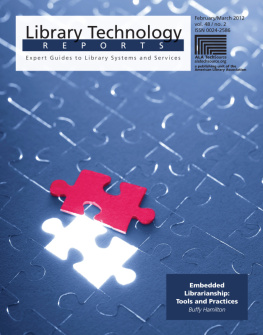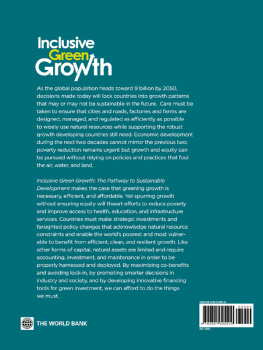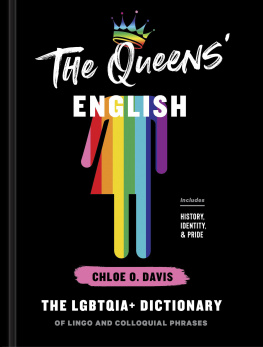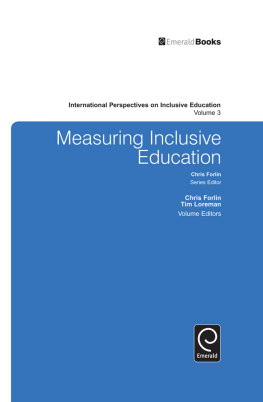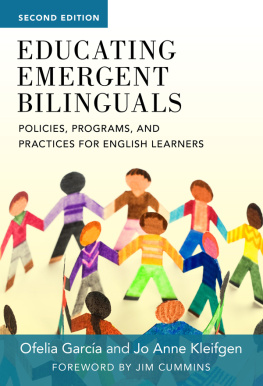Lucy Santos Green - LGBTQIA+ Inclusive Childrens Librarianship: Policies, Programs, and Practices
Here you can read online Lucy Santos Green - LGBTQIA+ Inclusive Childrens Librarianship: Policies, Programs, and Practices full text of the book (entire story) in english for free. Download pdf and epub, get meaning, cover and reviews about this ebook. year: 2022, publisher: ABC-CLIO, genre: Home and family. Description of the work, (preface) as well as reviews are available. Best literature library LitArk.com created for fans of good reading and offers a wide selection of genres:
Romance novel
Science fiction
Adventure
Detective
Science
History
Home and family
Prose
Art
Politics
Computer
Non-fiction
Religion
Business
Children
Humor
Choose a favorite category and find really read worthwhile books. Enjoy immersion in the world of imagination, feel the emotions of the characters or learn something new for yourself, make an fascinating discovery.

- Book:LGBTQIA+ Inclusive Childrens Librarianship: Policies, Programs, and Practices
- Author:
- Publisher:ABC-CLIO
- Genre:
- Year:2022
- Rating:4 / 5
- Favourites:Add to favourites
- Your mark:
- 80
- 1
- 2
- 3
- 4
- 5
LGBTQIA+ Inclusive Childrens Librarianship: Policies, Programs, and Practices: summary, description and annotation
We offer to read an annotation, description, summary or preface (depends on what the author of the book "LGBTQIA+ Inclusive Childrens Librarianship: Policies, Programs, and Practices" wrote himself). If you haven't found the necessary information about the book — write in the comments, we will try to find it.
Lucy Santos Green: author's other books
Who wrote LGBTQIA+ Inclusive Childrens Librarianship: Policies, Programs, and Practices? Find out the surname, the name of the author of the book and a list of all author's works by series.
LGBTQIA+ Inclusive Childrens Librarianship: Policies, Programs, and Practices — read online for free the complete book (whole text) full work
Below is the text of the book, divided by pages. System saving the place of the last page read, allows you to conveniently read the book "LGBTQIA+ Inclusive Childrens Librarianship: Policies, Programs, and Practices" online for free, without having to search again every time where you left off. Put a bookmark, and you can go to the page where you finished reading at any time.
Font size:
Interval:
Bookmark:
LGBTQIA+ Inclusive Childrens Librarianship
Policies, Programs, and Practices
Lucy Santos Green, Jenna Spiering, Vanessa Lynn Kitzie, and Julia Erlanger
Foreword by Anastasia M. Collins, MLIS, MA

Copyright 2022 by Lucy Santos Green, Jenna Spiering, Vanessa Lynn Kitzie, and Julia Erlanger
All rights reserved. No part of this publication may be reproduced, stored in a retrieval system, or transmitted, in any form or by any means, electronic, mechanical, photocopying, recording, or otherwise, except for the inclusion of brief quotations in a review, without prior permission in writing from the publisher.
Library of Congress Cataloging-in-Publication Data
Names: Green, Lucy Santos, 1977 author. | Spiering, Jenna, author. | Kitzie, Vanessa Lynn, author. | Erlanger, Julia, author.
Title: LGBTQIA+ inclusive childrens librarianship : policies, programs, and practices / Lucy Santos Green, Jenna Spiering, Vanessa Lynn Kitzie, and Julia Erlanger ; foreword by Anastasia M. Collins.
Description: Santa Barbara, California : Libraries Unlimited, 2022. | Includes bibliographical references and index.
Identifiers: LCCN 2022000006 (print) | LCCN 2022000007 (ebook) | ISBN 9781440876776 (paperback ; acid-free paper) | ISBN 9781440876783 (ebook)
Subjects: LCSH: Childrens librariesUnited States. | School librariesUnited States. | Libraries and sexual minoritiesUnited States. | BISAC: LANGUAGE ARTS & DISCIPLINES / Library & Information Science / General | SOCIAL SCIENCE / LGBTQ+ Studies / General
Classification: LCC Z718.2.U6 G74 2022 (print) | LCC Z718.2.U6 (ebook) | DDC 027.62/50973dc23/eng/20220120
LC record available at https://lccn.loc.gov/2022000006
LC ebook record available at https://lccn.loc.gov/2022000007
ISBN: 978-1-4408-7677-6 (paperback)
978-1-4408-7678-3 (ebook)
26 25 24 23 22 1 2 3 4 5
This book is also available as an eBook.
Libraries Unlimited
An Imprint of ABC-CLIO, LLC
ABC-CLIO, LLC
147 Castilian Drive
Santa Barbara, California 93117
www.abc-clio.com
This book is printed on acid-free paper 
Manufactured in the United States of America
Contents
Anastasia M. Collins, MLIS, MA
Foreword
The sense of belonging offered by library spaces and services can be like nothing else for students and young patrons. The rush of validation in the assurance that ones interests, needs, and culture are not only recognized but prioritizednot only reflected but centeredcan build lifelong bridges between young patrons, their community, and their library. For vulnerable and historically excluded populations, it can quite literally save lives. The opposite is also true when such belonging is absent or intentionally withheld.
For all that the field of librarianship talks about LGBTQIA+ inclusion, support of queer children and families has remained one-dimensional. Good service to queer children is really the combination of two straightforward principles: (1) they are a distinct and diverse patron group with distinct and diverse library and information needs; and (2) they are as entitled as any other patron group to excellent, equitable services and resources that meet their particular needs effectively. A librarys focus primarily on addressing representation on the shelves, while essential, is not enough. Commitments to building collections with good queer representation are not synonymous with providing good service, and the many other unchallenged barriers to inclusion can ensure that queer patrons dont make it past the threshold, let alone to the shelves. Similarly, overwhelmingly white and cisgender Pride Month displays not only fall short in terms of representation but also do nothing to address harmful policies or queermisic* and transmisic* staff behavior. Queer youth remain underserved in our librariesand make no mistake: they are aware of it as it steadily erodes their trust in libraries overall.
Even after my transition the library didnt feel safe. My school refused to change my name in the system and the librarian wouldnt write a note for his substitutes. The librarian would constantly misgender me even after being repeatedly spoken to by administration. This caused me to dread school library visits and avoid them at all costs. I dont read often anymore, dont enjoy library visits, and dont go out of my way to be in the library anymore. A name or pronouns may seem small or inconvenient to a librarian, representation may seem like a burden or unnecessary battle to take on, but the amount of good it would have done in my life and will do in younger queer kids life [ sic ] is huge.
Alex, white Latino, gay trans male, 8th grader
When we think of what exclusion of queer youth and families in the library looks like, this is the kind of toxicity and direct hostility we often picture. Queer- and transmisia* are indeed rampant in libraries, and active bigotry or unwillingness to extend minimal effort to respect patrons identities send clear messages about who does and does not matter in the library. But discrimination doesnt require a librarian to go out of their way to show disrespect. Neglect of queer childrens needs as patrons will get the job done just as well:
There was never a gay section. It was always a thing that was taboo and not meant for children to see. It was as if it was the most gross thing in the world, but we see standard [straight] couples in our childrens books. I only ever saw straight couples that never argued and had everyones support. I didnt know there was another way. It took me a while to realize that people arent perfect and it took a toll on me to accept the way I am. I was scared for the longest time.
Ivy, white, lesbian, 8th grader
No action or inaction in the library is neutral. Indifference and the failure to learn about and disrupt lazy, hurtful stereotypes and associations around queerness guarantees that they will persist. Ivys experience with the assumption that all aspects of queer existence relate to sex and shame or constitute mature content is all too common. When unchallenged, such stereotypes dont merely other the experiences of queer children and families, but also send the implicit (and absurd) message that the reality of a childs queer identity or family is inappropriate for them until they are older. Instead of being a space for self-discovery, the library instead becomes another place of offensive labels and restrictive boxes.
Even libraries intentional about queer inclusive programming can fall prey to the more insidious pitfalls of performativity. Inclusive efforts, instead of striving to transform the library, seek to check a box without disturbing the status quo:
Libraries have always been a big part of my life. All of my family loves to read, and back when we didnt have things like cable and wifi, we always had the library. I remember my first pride month as an openly queer person when I walked into the library and saw the colorful decorations at the front desk, I was simply overjoyed. It made me feel included and accepted there. Unfortunately, like nearly every other public place, the decorations, and the inclusivity went away after Pride Month was over. Although it would be unrealistic to expect the flamboyant decorations year-round, simply adding a section of LGBTQIA+ stories and books by LGBTQIA+ Authors would do wonders. Or even putting a pride flag in the window to show that we are supported at this library. By doing this, it will give closeted LGBTQIA+ youth a place where they can feel safe and accepted.
Anonymous, Black, genderqueer, 9th grader
Next pageFont size:
Interval:
Bookmark:
Similar books «LGBTQIA+ Inclusive Childrens Librarianship: Policies, Programs, and Practices»
Look at similar books to LGBTQIA+ Inclusive Childrens Librarianship: Policies, Programs, and Practices. We have selected literature similar in name and meaning in the hope of providing readers with more options to find new, interesting, not yet read works.
Discussion, reviews of the book LGBTQIA+ Inclusive Childrens Librarianship: Policies, Programs, and Practices and just readers' own opinions. Leave your comments, write what you think about the work, its meaning or the main characters. Specify what exactly you liked and what you didn't like, and why you think so.


